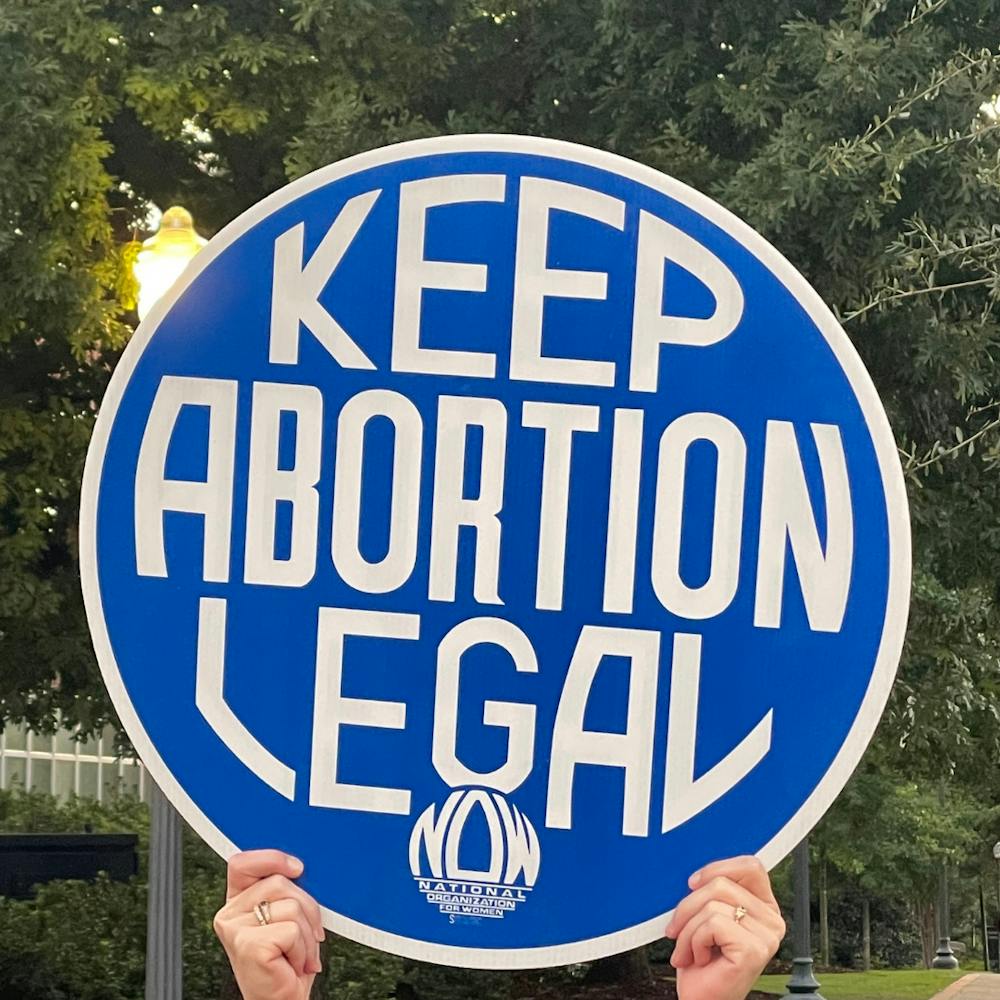On Sept. 1, Texas enacted the most restrictive abortion law in the nation. The law — dubbed by its supporters as the “heartbeat bill” — bans a woman's constitutional right to abortion as soon as cardiac activity can be detected in the embryo.
This typically happens around the sixth week of pregnancy.
A woman is four-weeks pregnant by the time she misses her period.
That means she would have about two weeks to realize she is pregnant, take a test to confirm it, make a decision and actually have the procedure done.
Two weeks.
Some people can reach the six-week mark and still not know they are pregnant. At that point under the Texas abortion ban, a woman would have to continue with her pregnancy, regardless of if she wants to or has the means to care for a child afterwards.
Make no mistake — if someone doesn't want to have a baby, for whatever reasons they might have, they won't have one.
Some will find other, potentially life-threatening and dangerous means to terminate the pregnancy. This can range from taking a pill which is relatively safe to causing trauma to the uterus or body. These self-managed abortions do not come out of any presumed wickedness, but rather out of a sense of urgency to not be held responsible for anyone else's life other than their own. According to research conducted from 2008-2010, 40% of women wanted an abortion because they were not financially prepared, and 4% of women just didn’t want a baby.
Ultimately, the woman would have to carry the baby — ideally to term — and it is generally expected that they take care of them after birth. It is their choice, and their decision to make.
Or, it should be their decision to make.
The law does not make exceptions for rape or incest. It allows abortions for health reasons, but the exceptions are narrow and don’t cover every chance their health may be in jeopardy.
The above is not only true of the Texas law, but bears resemblance to the Alabama Human Life Protection Act, or the Alabama abortion ban.
The Human Life Protection Act is an Alabama law enacted on May 15, 2019, that was blocked by a federal judge and is yet to be implemented. It was intended to impose a near-total ban on abortion at any stage starting in November 2019. Like the Texas law, exceptions are narrow: if the fetus has a “lethal anomaly," if the pregnancy presented “serious health risks” to the mother or if the mother has an ectopic pregnancy.
Under the act, an Alabama doctor who preforms a banned abortion would be guilty of a Class A felony and could be sentenced to life imprisonment, the same punishment for crimes such as rape and murder.
The act was never implemented due to a preliminary injunction issued by U.S. District Court Judge Myron Herbert Thompson in October 2019, but with the Texas law going unchallenged by the Supreme Court, a dangerous precedent is being set — one that lawmakers in North and South Dakota, Mississippi, Indiana, Arkansas and Florida are looking to enact as of Sept. 3.
The delayed Alabama abortion ban is similar to the Texas ban, but differ in one crucial way: In Texas, the enforcement of the ban lies in the hands of citizens.
The law deputizes ordinary citizens, including those outside of Texas, in permitting them to sue clinics and others who violate the law.
Those who report abortions in Texas are awarded at least $10,000 per illegal abortion if they are successful. Patients cannot be sued, but doctors, staff and even their Uber driver can become potential defendants. In Alabama, too, if the abortion ban had been passed, patients could not be held criminally or civilly liable.
The law was, by design, extremely hard to challenge in court before it went into effect. After it was implemented, the Supreme Court had the opportunity to decide whether the law was unconstitutional, and the court chose to allow it.
Now, all around the country women are asking the same question: What could the Texas abortion ban mean for me?
This editorial is meant not only to serve as an explanation of the Texas and Alabama abortion bans, but also as a plea.
Alabama, do not follow in Texas’ footsteps.
What is concerning is the fate of those who attend school in Alabama but are permanent residents of Texas. What of those women, who may feel as if they have no choice but to get an abortion in order to continue their schooling? Will their neighbors — men or women who they trust, who were friends or mentors, teachers or their pastor — now become an enemy? A bounty may not be on the patients’ head, but all burdens lie on their shoulders.
Do they choose themselves and potentially condemn anyone who dares to help them to face a lawsuit? Or do they choose to commit themselves to raising a child for 18 years, while possibly not having the resources to properly care for it?
The least that could be asked is to not make it harder than it already is.
As it stands, there are only three abortion clinics in Alabama in Montgomery, Tuscaloosa and Huntsville.
As of Jan. 1, 2021, women considering an abortion must receive state counseling, which includes information designed to discourage women from going through with it. Patients then have to wait two days before they can have the procedure done. If a woman had only two weeks after realizing she was pregnant to have an abortion, three days could be wasted if Alabama adopted a similar law, with these restrictive measures already in place.
This year has marked the worst year ever in the U.S. for abortion rights. As of July 1st, 90 abortion restrictions have been enacted — more than in any year since the Roe v. Wade decision in 1973.
What some lawmakers may not understand is that this year — as COVID drags into its 17th month — all roads will eventually lead back to the pandemic.
People will remember how you restricted abortion rights. They will remember how you vilified women and placed these burdens on them. They will remember you took away their right to choose. And they will remember that all of this was done while 1,500 people were dying a day from the delta variant.
Pro-life enough to choose an unborn baby over the thousands upon thousands of lives that could’ve been saved with a simple mask mandate, or now that Pfizer is FDA-approved, a vaccination mandate. Pro-life enough to potentially bring a child into this world, when lawmakers are willing to let so many of them succumb to a virus now.
There are already actions being taken to deem this law unconstitutional. Despite this, it looks like many states will try and mimic Texas anyways, to try something similar in hopes that it will stick.
It’s time to choose, Alabama. Will you follow Texas?
Sit this one out. We’ve gotten close enough to a near-complete ban on abortion, and that is as far as it should go.
Give Alabama women hope, and give them confidence that their state will not turn on them.
Do you like this story? The Plainsman doesn't accept money from tuition or student fees, and we don't charge a subscription fee. But you can donate to support The Plainsman.
Editorials represent the majority view of The Plainsman's editorial board and do not necessarily represent that of the entire newsroom.





